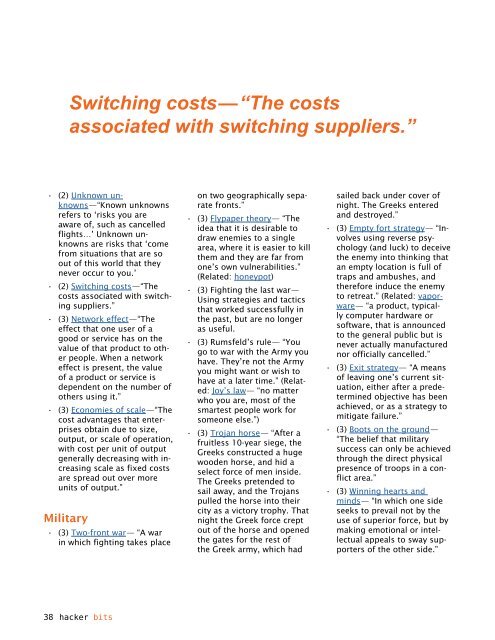Hacker Bits, August 2016
HACKER BITS is the monthly magazine that gives you the hottest technology stories crowdsourced by the readers of Hacker News. We select from the top voted stories and publish them in an easy-to-read magazine format. Get HACKER BITS delivered to your inbox every month! For more, visit https://hackerbits.com/2016-08.
HACKER BITS is the monthly magazine that gives you the hottest technology stories crowdsourced by the readers of Hacker News. We select from the top voted stories and publish them in an easy-to-read magazine format.
Get HACKER BITS delivered to your inbox every month! For more, visit https://hackerbits.com/2016-08.
Create successful ePaper yourself
Turn your PDF publications into a flip-book with our unique Google optimized e-Paper software.
Switching costs — “The costs<br />
associated with switching suppliers.”<br />
• (2) Unknown unknowns<br />
— “Known unknowns<br />
refers to ‘risks you are<br />
aware of, such as cancelled<br />
flights…’ Unknown unknowns<br />
are risks that ‘come<br />
from situations that are so<br />
out of this world that they<br />
never occur to you.’<br />
• (2) Switching costs — “The<br />
costs associated with switching<br />
suppliers.”<br />
• (3) Network effect — “The<br />
effect that one user of a<br />
good or service has on the<br />
value of that product to other<br />
people. When a network<br />
effect is present, the value<br />
of a product or service is<br />
dependent on the number of<br />
others using it.”<br />
• (3) Economies of scale — “The<br />
cost advantages that enterprises<br />
obtain due to size,<br />
output, or scale of operation,<br />
with cost per unit of output<br />
generally decreasing with increasing<br />
scale as fixed costs<br />
are spread out over more<br />
units of output.”<br />
Military<br />
• (3) Two-front war — “A war<br />
in which fighting takes place<br />
on two geographically separate<br />
fronts.”<br />
• (3) Flypaper theory — “The<br />
idea that it is desirable to<br />
draw enemies to a single<br />
area, where it is easier to kill<br />
them and they are far from<br />
one’s own vulnerabilities.”<br />
(Related: honeypot)<br />
• (3) Fighting the last war —<br />
Using strategies and tactics<br />
that worked successfully in<br />
the past, but are no longer<br />
as useful.<br />
• (3) Rumsfeld’s rule — “You<br />
go to war with the Army you<br />
have. They’re not the Army<br />
you might want or wish to<br />
have at a later time.” (Related:<br />
Joy’s law — “no matter<br />
who you are, most of the<br />
smartest people work for<br />
someone else.”)<br />
• (3) Trojan horse — “After a<br />
fruitless 10-year siege, the<br />
Greeks constructed a huge<br />
wooden horse, and hid a<br />
select force of men inside.<br />
The Greeks pretended to<br />
sail away, and the Trojans<br />
pulled the horse into their<br />
city as a victory trophy. That<br />
night the Greek force crept<br />
out of the horse and opened<br />
the gates for the rest of<br />
the Greek army, which had<br />
sailed back under cover of<br />
night. The Greeks entered<br />
and destroyed.”<br />
• (3) Empty fort strategy — “Involves<br />
using reverse psychology<br />
(and luck) to deceive<br />
the enemy into thinking that<br />
an empty location is full of<br />
traps and ambushes, and<br />
therefore induce the enemy<br />
to retreat.” (Related: vaporware<br />
— “a product, typically<br />
computer hardware or<br />
software, that is announced<br />
to the general public but is<br />
never actually manufactured<br />
nor officially cancelled.”<br />
• (3) Exit strategy — “A means<br />
of leaving one’s current situation,<br />
either after a predetermined<br />
objective has been<br />
achieved, or as a strategy to<br />
mitigate failure.”<br />
• (3) Boots on the ground —<br />
“The belief that military<br />
success can only be achieved<br />
through the direct physical<br />
presence of troops in a conflict<br />
area.”<br />
• (3) Winning hearts and<br />
minds — “In which one side<br />
seeks to prevail not by the<br />
use of superior force, but by<br />
making emotional or intellectual<br />
appeals to sway supporters<br />
of the other side.”<br />
38 hacker bits















